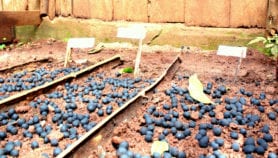By: Bernard Appiah
Send to a friend
The details you provide on this page will not be used to send unsolicited email, and will not be sold to a 3rd party. See privacy policy.
Ghana’s policymakers should embrace abundant and clean biogas as a source of energy, to curb its reliance on dwindling wood resources for fuel, say researchers.
The country has huge potential for producing biogas, including the technical expertise to construct almost 280,000 biogas plants, but it faces many obstacles in achieving this, according to a study published in the May issue of Renewable Energy.
Richard Arthur, a researcher at the Koforidua Polytechnic, in Ghana, and colleagues reviewed the literature on the country’s renewable energy to determine the status of biogas in the country.
They also calculated the biogas potential of the dung of cattle, sheep, goats, pigs and poultry for 2006, which was about 350 million cubic metres.
But, despite the potential, most households still depend on wood fuel as a primary energy source (72 per cent) and only about 100 plants had been set up by 2008, they said.
Over-reliance on wood fuel has been partly responsible for the decrease in Ghana’s forest cover from 8.13 million hectares at the beginning of the last century to 1.6 million hectares in 2008.
Edem Cudjoe Bensah, a research fellow with the Energy Centre at the Kwame Nkrumah University of Science and Technology, Ghana, said the obstacles include a lack of attention from politicians, who are not interested in disseminating the technology, the high cost of constructing biogas plants and the unwillingness of people to use biogas for cooking because they consider it to be ‘toilet gas’.
"In other countries we see the politicians themselves getting involved in the dissemination of the technology," Bensah told SciDev.Net, citing China, India and Japan.
He added that setting up a national advocacy programme on biogas may help overcome some of these obstacles.
But Wisdom Ahiataku-Togobo, director of renewable energy at Ghana’s Ministry of Energy, said it is more expensive to produce electricity from biogas than from diesel power plants.
"We realise that biogas is technically viable but it is not economically suitable to promote it on a large scale for the sole purpose of energy," said Ahiataku-Togobo. "So what the ministry is doing now is promoting biogas for the sole purpose of addressing sanitation, mainly for treating waste [generated by households and institutions]."
However, Bensah maintained that biogas has wider applications and needs more attention. "For biogas to make a big impact in our households, [it] will require a lot of effort from government, from academia, and from the private sector," he said.
References
Renewable Energy doi: 10.1016/j.renene.2010.11.012 (2011)













